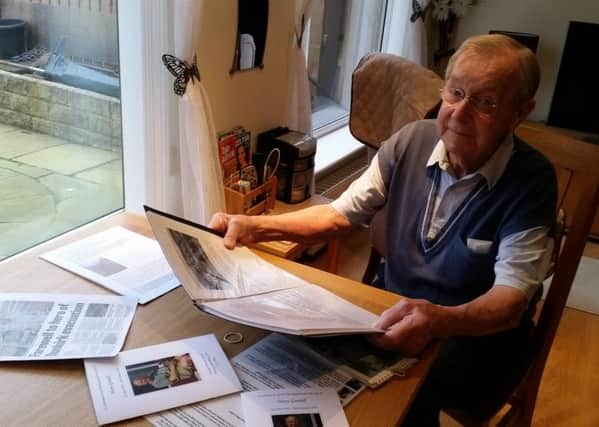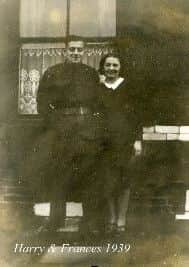Leeds nostalgia: Diary of Leeds war veteran reveals moment of capture


Buried in the pages of his account are heart-rending tales of how he endured great hardship and was at times overwhelmed by hunger and despair.
But amid the hopelessness and rampant dejection which ran rife through the ranks of those captured by the Germans, glow the embers of hope - for what comes across more than anything from Harry’s diary is an unerring sense of optimism, of deep-rooted iron will, which saw him by, even during his darkest days. Throughout his internment, he thought constantly of his then girlfriend (and future wife), Frances, back in England...
Advertisement
Hide AdAdvertisement
Hide AdHarry was called up for national service in October 1939, aged just 20. He joined the Royal Army Service Corps, part of the 51st Highland Division and was a driver. He was deployed to France in January 1940.


At the beginning of May 1940, Neville Chamberlain was still Prime Minister but on the Continent the German land army was virtually unbeatable. Holland fell, France fell and in the weeks that followed, the Allies were pushed back to the French coastline.
Harry writes: “A bitterly cold and severe winter, we were billeted at Allounge and later east of Metz. In May 1940 German forces invaded Holland, Belgium, Luxembourg, into France. Orders were given to move to Abbeville which necessitated a mad dash across from Metz. On May 27 the British Army was evacuated from Dunkirk. We arrived at St Valery-en-Caux early on June 11. The small seaside town was packed with French troops, no firearms. The French had surrendered.
“On the night of the June 11, most of the town was ablaze after the German shelling. At this time I remember being on the side of the small harbour and a small launch arrived bringing a Royal Navy Officer and two naval ratings. They came to check the situation and to prepare for an evacuation.
Advertisement
Hide AdAdvertisement
Hide Ad“By this time the beach was crowded with British troops, the tide was coming in and a cold breeze coming off the sea. I was feeling very cold now it was about 3am. Kit and equipment was lying about all over the beach, so I helped myself to a pullover. I lost all mine in the attack on the convoy. That pullover was almost a lifesaver to me in the days ahead.


“We approached the two transporter ships only to discover they were packed to the gunwales with troops. Was it worth trying to swim to it and try to cling on to something or should I wait for another ship to come? I did wait, but none came. The two ships were aground because of the receding tide. The Germans began to shell the two-grounded ships, troops jumping off in all directions. Now what would happen? I looked out to sea half hoping to see more ships heading our way. What I did see was a destroyer putting up a smoke screen, which covered the whole width of the bay. Still optimistic I thought it was a ruse to bring the ships closer under the smoke screen. The smoke cleared on the morning breeze, a feeling of despair swept over me, all the ships had gone. I now realised this was the end - what the end would entail I did not know, was this to be the end of my life at 21?
“A few of us picked up our rifles, which had been discarded on the beach and took up positions on the cliffs - yet men were walking past us as if out on a stroll. A little way behind them, I saw an officer with a handkerchief tied to a walking stick. Shouting to us, he said, “It’s all over”. Behind him I saw two little men with machine guns and different uniforms - I realised they were Germans. In our training, such as it was, nobody told us we might be captured! Or what a swastika looked like but now I knew and I was filled with bitterness and despair.
“They took us into a field on the cliff top. It was 10am on June 12, 1940, a glorious sunny morning and a cloudless blue sky. I stood alone for a moment looking west over the sea. Over there was my sweetheart, my mother and sister. In my mind, I had a clear mental picture of them. Would I ever see them again and I prayed that God would keep them safe in the conflict to come.
Advertisement
Hide AdAdvertisement
Hide Ad“I heard a voice shouting in a strange language. I turned my back to the sea,and my loved ones in England and with the picture of Frances deeply imprinted on my mind I began to walk into the unknown - only eight months ago I was working in Tetley’s Brewery.
“On the cliff top field, we were given a British Army tin of Irish stew between three. Although cold it was quite acceptable, not having eaten for 48 hours. I had my Army knife, the only thing I possessed, to open the tin - but nothing to eat it with. I took a piece of wood from a packing case in the field and with my knife made something resembling a spoon and we tried to eat a third of the stew each.
“By now, the sun was hot, the sky was blue, birds were singing but I was very, very unhappy. I remember clearly thinking of what Frances might be doing at that particular time, perhaps serving her last customer before having the Wednesday afternoon off. Pain and anguish filled my mind and I was deeply distressed, would we ever meet again? Would the separation be too much to bear? In three days time (June 15) I had been due to go on leave when we would be together again, wanting to make plans for the future but I was in a state of intense anxiety, with a painful uncertainty of what the future held…”
Next week, read how Harry was force marched over hundreds of miles, having to scavenge for food and the cold hard reality of life inside a German PoW camp.